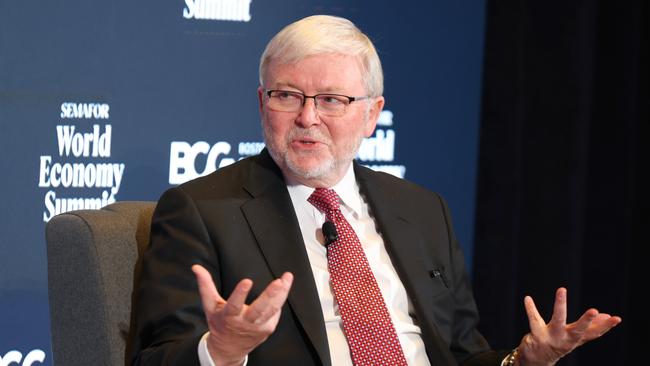Kevin Rudd says Australia can solve US critical minerals dilemma
Kevin Rudd says an Australian proposal will allow the US to become effectively self-reliant in critical minerals and improve its economic resilience against a rising China.

Kevin Rudd says a draft accord proposed by Australia and presented to the Trump administration would allow the US to effectively become self-reliant in critical minerals, bolstering American economic resilience against China and strengthening ties between Canberra and Washington.
Speaking at the Mackinac Police Conference in Detroit, Dr Rudd said there were opportunities to enhance collaboration with America in the areas of critical minerals and by tapping the power of Australian superannuation funds for US-based investments – including in Michigan.
The Australian ambassador also identified a key challenge for democracies in an era of growing political polarisation – the prevention of social disruption which threatened to break the “democratic contract between government and the governed”. A failure on this score would lead people to “look for alternatives”, he said.
Speaking in conversation with Sandy Baruah, the chief executive of the Detroit Regional Chamber, Dr Rudd warned that China was seeking to entrench its dominance “across the 50 categories of critical minerals” designated by the US government.
“The President of the United States has said this is a strategic priority. We agree with him,” he said. “The geology of the United States does not permit you to be self-reliant in all 50 because they’re not all here. But if you add Canada and Australia, you are.
“So what we need to work out – and we have a draft accord with the administration at present on these questions – is how do we collaborate both on the mining, the extraction, the transportation and the processing and the stockpiling to make our economies resilient, including what you’ll need for future battery manufacture for the future.”
He also said Australian superannuation savings were valued at $3 trillion in US dollars – “larger than the sovereign funds of Saudi Arabia, United Arab Emirates and Qatar combined”.
“Our funds cannot invest all those funds within Australia,” he said. “So, increasingly, they are diversifying offshore. Increasingly, they are coming here and they are investing in big long-scale, long-term infrastructure projects in various states in the United States.”
Despite a period of change in the US under Donald Trump, Dr Rudd said Australia’s alliance with Washington had endured over the terms of 15 US presidents and 15 Australian prime ministers. This was because it was anchored in “common interests and common values”.
He said it was strengthened by strong institutions, including the ANZUS treaty, the AUKUS trilateral security partnership, the Five Eyes intelligence sharing network, the Quadrilateral security dialogue and – despite a few “recent bumps in the road” – the US/Australia free trade agreement.
“Sure, President Trump’s administration has different priorities. But I printed the embassy mugs. On the outside it says, ‘Keep calm, we’re Australian,’” he joked. “And we’ll work our way through all of these little challenges.”
Dr Rudd said Australians had seen the first Trump administration, the election of Joe Biden, and now the return of President Trump, but were used to an aggressive style of politics.
“I think the view down under is that this is a very big country,” Dr Rudd said. “It has as dynamic a democracy as ours. And we have a pretty robust democracy ourselves. It’s take-no-prisoners, slug-and-punch sort of stuff. We’re not a bunch of innately conciliatory Europeans who have a committee to solve most problems. We’re sort of more into the biff.
“So when we see this happening here we go, ‘Oh, that’s interesting.’ But we see a lot of resonances with the way in which we conduct our politics down under.”
Dr Rudd said that around the world there was an emerging question over political, social and economic polarisation. He said those in the “global political centre” needed to be deeply attentive to the disruption within democracies arising from growing polarisation.
He said this was important to “make sure of one thing” – that everyone had an ongoing “physical and emotional stake in the continuation of the democratic contract between government and the governed. Otherwise people peel off. And they look for alternatives.”
Dr Rudd also warned that China, under Xi Jinping, was aiming to achieve a profound geopolitical transformation by rising to become the world’s largest military force and economic power. He said this set up a contest with the US, but there was also a contest over the “unfolding technology revolution” over artificial intelligence and the “never to be silenced challenge of climate change”.
Dr Rudd said China was the “macro challenge” and that President Xi wanted to take Taiwan and displace the US as the world’s superpower.
He said there were a couple of key responses, of which the first pillar was deterrence. Dr Rudd said this meant directing efforts to deter the Chinese from using “unilateral military force to change the map in the Indo-Pacific, of which Taiwan is the central piece.”
“That is an ongoing challenge for your military, for the Taiwanese, for your allies in Japan and in Australia,” he said. “But I’m here to report that since 1949 we’ve all succeeded. It’s been contained. It’s actually a successful exercise in integrated deterrence.”





To join the conversation, please log in. Don't have an account? Register
Join the conversation, you are commenting as Logout